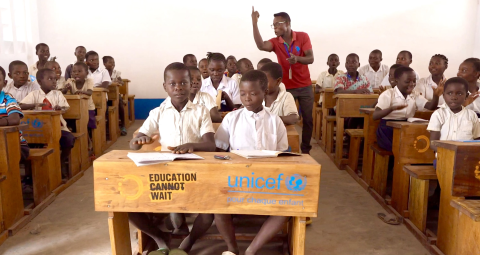ECW, UNICEF, Partners Seek Increased Funding To Support Children In DRC
African News, East/Central Africa, Latest Headlines Friday, October 28th, 2022
(AFRICAN EXAMINER) – Education Cannot Wait (ECW), the United Nations (UN) global fund for education in emergencies and protracted crises, the United Nations Children’s Fund (UNICEF) and partners have canvassed for substantial increase in funding for crisis-affected children in the Democratic Republic of the Congo (DRC).
There are currently about 5 million internally displaced persons in DRC (of whom 700,000 were displaced in 2022 alone), the largest in Africa. Moreover, years of conflict, climate change, COVID-19 and other epidemics including Ebola have taken a heavy toll on the country’s young generation. Nationwide, as many as 3.2 million children (aged 6 to 11) are out of school.
Director of ECW, Ms. Yasmine Sherif, and the UNICEF Representative, Grant Leaity, and the Development Director at the British Embassy in DRC, Ms. Laura Mazal recently met government officials and education partners in Kinshasa and visited Tanganyika province in south-eastern DRC on a joint mission. Tanganyika province has recently become more peaceful after years of inter-ethnic conflict impacted the lives of children and teenagers.
Tanganyika is a tough place for girls to grow up, with young women all too often exposed to various forms of violence and exploitation including sexual assault and child labor. More than 430 girls and boys in Tanganyika have also received UNICEF-supported gender-based violence response services, while another 464 children have received reintegration support and protection after escaping from armed groups.
Ms. Sherif and Leaity jointly called on donors worldwide to provide US$45 million in urgent, additional funding to support ECW’s Multi-Year Resilience Programme in the DRC, a country facing one of the world’s most overlooked crises.
The call was made during the recent visit to an ECW-funded programme implemented by UNICEF, in collaboration with the Government of the DRC and provincial education authorities, and other key implementing partners, including: World Food Programme (WFP), CENEAS, Armée du Salut, and other local partners.
The joint programme aims to improve schooling and vocational training, with a focus on girls and young women. It targets 67,000 children and adolescents in the province; 32,000 girls and boys have already been reached with quality education. It is estimated that nearly two-thirds of school-aged children (aged 6 to 17) – are out of school in the province.
While commenting on the situation, Ms. Sherif said: “I am deeply moved by the strength and resilience of the girls, boys and teachers I met whose lives have been transformed by education and local partner support, the UN, civil society and communities working together”.
Most of them, according to her, come from displaced families and have never been to school before and that education is their only hope.
“Their courage and the efforts by the community and local partners to ensure all children go to school inspire us all to do more. We call on public and private donors to urgently step up their support for all crisis-affected girls and boys in DRC and worldwide to have the opportunity to enjoy their right to a safe, protective, inclusive quality education”, she added.
She also noted that schools play an important part in reducing tensions between different community groups, which often spills over into armed conflicts.
“We must step up to help the next generation to heal from the wounds of violence. It is crucial to jointly expand holistic education programmes that integrate psychosocial support, gender transformative approaches and a focus on safety and the well-being of children and adolescents.
“At the same time, more must be done to stop this cycle of unspeakable violence and systematic violations of human rights and of the international humanitarian law. The pervasive impunity must end, perpetrators must be brought to justice”, she further explained.
UNICEF DRC Representative, Leaity expressed gratitude for the support being rendered by the ECW.
“Thanks to ECW support, we can provide and enhance access to quality education and alternative learning opportunities for all children, especially girls who have suffered so much. It is heart-warming that we have been able to respond to their specific needs”, he stated.
He added that although the challenges are significant (see Notes for Editors below), important progress in relation to the provision of education in Tanganyika is being made.
On her part, Ms. Mazal said the UK is one of ECW’s founding strategic partners and is the Fund’s second largest donor globally, adding that access to quality education in times of humanitarian crisis is life-saving for children.
“It offers protection, a sense of normality and hope. That is why ECW’s work is crucial in providing support to the most marginalized children. We have seen first-hand the work being delivered on the ground in Tanganyika, from meeting girl survivors of sexual violence to children formerly associated with armed groups.
These children are now receiving a quality education, with huge thanks to ECW”, she stressed.
However, the large number of internally displaced people (nearly 350,000) in Tanganyika province represents a key challenge that hampers access to education.
There are just 4,300 primary and secondary schools to educate more than 1.8 million school-aged children. According to recent estimates, at least 1,700 more schools need to be built to ensure children and adolescents access safe and protective quality learning environments.
The joint delegation inaugurated the newly built Lubile 1 Primary School in Mpungwe Village, located near the provincial capital Kalemie, and visited a tented temporary learning space supported by the ECW investment. The overall aim is to support the government’s drive to implement free education throughout the DRC.
The Lubile 1 Primary School is the first to be constructed in Mpungwe Village. Mpungwe Village originally comprised 500 families, but in recent years, due to violence and insecurity in the region, an additional 1,500 families have now settled in the village. A model of social cohesion, both host community and displaced children all go to school together, benefiting from a holistic education approach, including daily schools supported through the WFP school canteen.
Related Posts
Short URL: https://www.africanexaminer.com/?p=82493






















